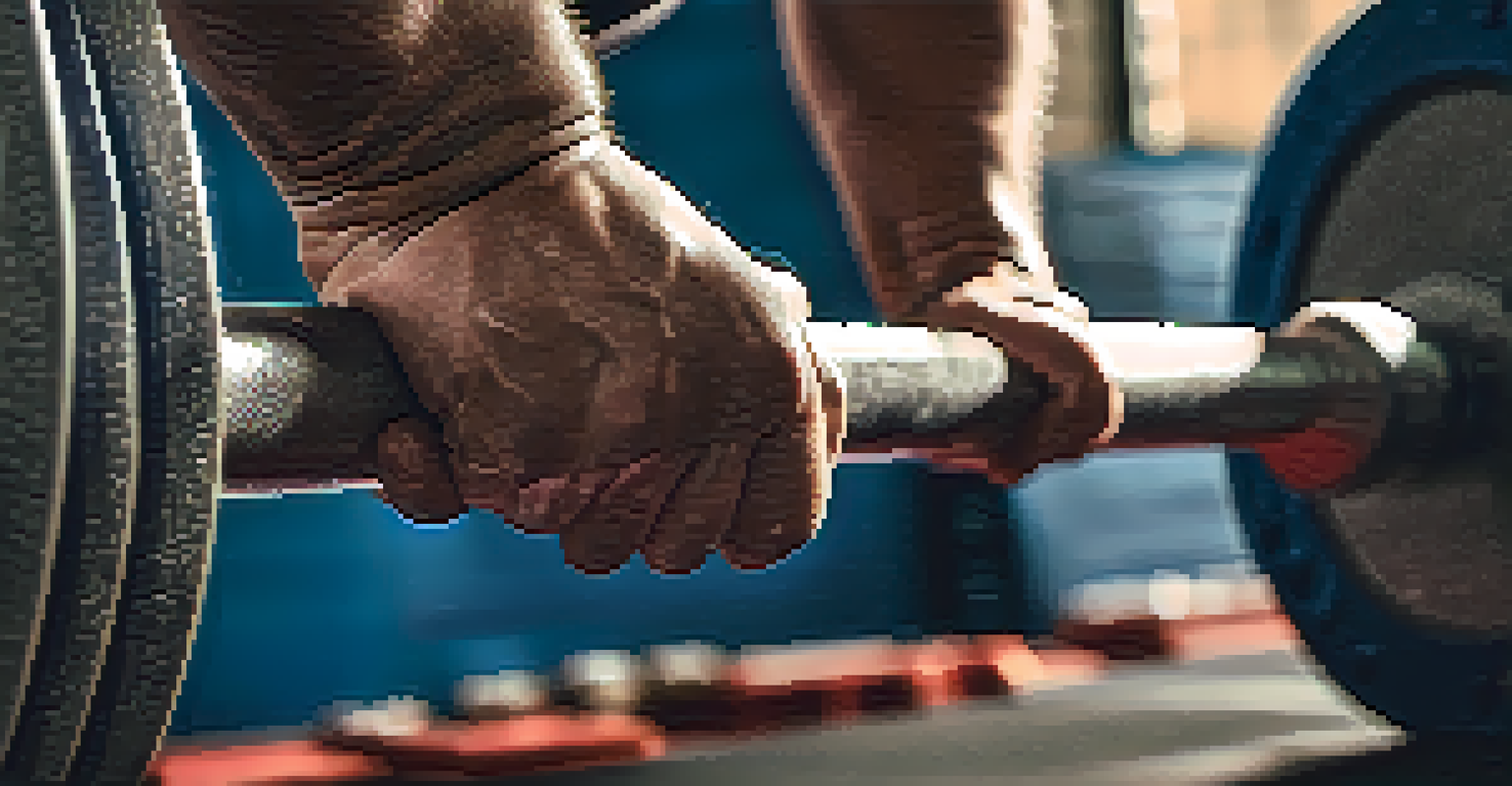Powerlifting: A Pathway to Improved Mental Well-Being

Understanding the Link Between Powerlifting and Mental Health
Powerlifting, a strength sport focusing on three main lifts, has gained popularity not just for physical benefits but also for mental health improvements. Engaging in such a physically demanding activity can lead to significant mental resilience. It’s fascinating how lifting heavy weights can trigger a cascade of endorphins, the body's natural mood lifters.
Strength does not come from physical capacity. It comes from an indomitable will.
Many powerlifters report enhanced mood and reduced anxiety levels, which can be attributed to the discipline and focus required in training. The act of pushing one's limits and achieving personal bests fosters a sense of accomplishment, which is crucial for mental well-being. This combination of physical exertion and psychological reward creates a powerful foundation for mental health.
Additionally, the community aspect of powerlifting can alleviate feelings of isolation. Being part of a supportive group that shares similar goals can provide emotional support and camaraderie, making the journey not just about lifting weights but also about building lasting relationships.
The Role of Discipline in Powerlifting and Mental Fortitude
Discipline is a cornerstone of both powerlifting and mental strength. Committing to a training regimen requires consistent effort and sacrifice, which can translate into other areas of life. This dedicated approach can help individuals develop a strong sense of responsibility and perseverance.

As lifters adhere to strict training schedules and nutrition plans, they learn to set and achieve goals. This goal-oriented mindset fosters resilience, as overcoming challenges in the gym can empower individuals to tackle obstacles outside of it. For many, the gym becomes a safe space to build mental fortitude.
Powerlifting Boosts Mental Health
Engaging in powerlifting not only improves physical strength but also enhances mood, reduces anxiety, and fosters a sense of community.
Moreover, the structured nature of powerlifting teaches valuable lessons in patience and delayed gratification. Progress in lifting isn’t always linear; it requires time and persistent effort. This understanding helps individuals cultivate patience, which is essential for managing stress and overcoming life’s challenges.
Stress Relief Through Physical Activity and Powerlifting
One of the most immediate benefits of powerlifting is the stress relief it provides. Physical activity, in general, helps reduce stress hormones like cortisol while boosting endorphins. When you lift weights, you channel your frustrations and anxieties into the workout, resulting in a profound sense of release.
The only way to prove that you are a good sport is to lose.
After a heavy lifting session, many find a significant reduction in stress levels and an enhanced overall mood. This cathartic experience can serve as a healthy coping mechanism for life’s pressures. Instead of turning to less constructive outlets, powerlifting offers a way to process emotions positively.
Additionally, the intense focus required during lifting can serve as a form of mindfulness. In those moments, lifters concentrate solely on their form and the weights in front of them, effectively putting aside their worries. This focus can lead to a meditative state, allowing individuals to reconnect with themselves and find peace amidst chaos.
Building Confidence and Self-Esteem Through Lifting
Powerlifting can be a transformative journey for self-esteem and body image. As lifters witness their physical strength improve, they often experience a boost in confidence. This newfound strength can extend beyond the gym, positively impacting various areas of their lives.
Setting and achieving personal records can create a powerful sense of accomplishment. Each lift is a testament to one's hard work, and celebrating these milestones reinforces a positive self-image. Over time, this can help individuals break free from negative self-perceptions and embrace their bodies for what they can achieve.
Discipline Cultivates Resilience
The commitment required for powerlifting builds discipline and resilience, skills that translate into other areas of life.
Moreover, the supportive environment within powerlifting communities often encourages individuals to celebrate each other's successes. This collective positivity fosters an atmosphere where everyone feels valued, further enhancing confidence. Together, lifters uplift each other, creating a ripple effect of self-acceptance and empowerment.
Powerlifting as a Community: A Source of Emotional Support
The community aspect of powerlifting is one of its most enriching features. Gyms often become a second home, where lifters share their struggles and victories. This sense of belonging can significantly enhance one’s mental well-being.
Having a support network not only fosters accountability but also provides emotional comfort. Lifters find encouragement from peers, which can be particularly beneficial during tough times. Whether it's preparing for a competition or dealing with life challenges, the community offers a network of understanding and support.
Additionally, sharing experiences and advice helps create deeper connections. Lifters often form friendships that extend beyond the gym, leading to a robust support system in daily life. This emotional backing can be invaluable for mental health, emphasizing the importance of social connections.
Setting and Achieving Goals: A Mental Health Booster
Setting realistic and achievable goals in powerlifting can significantly boost mental health. These goals serve as benchmarks for progress, providing a sense of direction and purpose. Whether it’s hitting a new weight or improving form, each achievement can enhance motivation and self-worth.
The process of working towards a goal fosters a growth mindset. Lifters learn to view setbacks as opportunities for growth rather than failures. This shift in perspective can extend beyond lifting, positively influencing other areas of life and promoting resilience.
Community Offers Emotional Support
The supportive environment within powerlifting communities provides emotional backing, which is crucial for mental well-being.
Moreover, celebrating these milestones—no matter how small—reinforces positive behavior. Each time a lifter reaches a goal, they are reminded of their capacity to succeed. This continuous cycle of setting, striving for, and achieving goals contributes to a healthier mindset and emotional well-being.
Mindfulness and Focus: The Mental Benefits of Powerlifting
Powerlifting requires immense focus and concentration, qualities that can translate into mindfulness practices. When lifters prepare for a lift, they engage in a mental rehearsal, visualizing the successful execution of the movement. This practice not only enhances performance but also instills a sense of calm and clarity.
The act of lifting itself serves as a form of meditation. In those moments, lifters often find a state of flow, where their minds quiet, and they become fully absorbed in the task at hand. This heightened awareness can lead to greater mental clarity and reduced anxiety.

Furthermore, this focus on the present moment can help alleviate worries about the future. By immersing themselves in their lifts, individuals learn to appreciate the here and now, fostering a sense of peace. This mindfulness practice can be a powerful tool for managing everyday stress and anxiety.